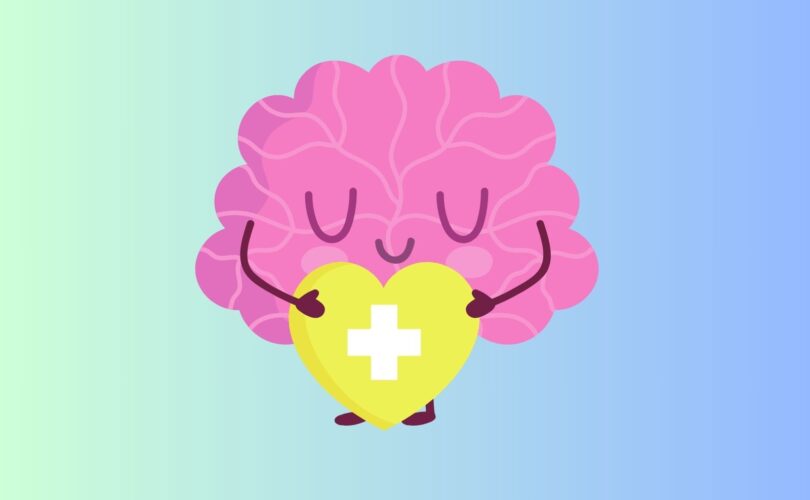Your mental health influences absolutely every area of your life. It holds sway over how you think, behave, and feel. It will determine how you cope with stress, how you deal with adversity, and whether you are capable of achieving your goals or not.
When you are positive and energized it’s easier to handle what life throws at you. It becomes much more difficult when you’re caught up in a cycle of negativity and constantly downtrodden.
What does good mental health really mean? Let’s nix one thing immediately – good mental health does not mean that you’re happy all the time, or even most of the time. Happiness is great and it’s nice to have it. However, good mental health is about thinking and feeling positively most of the time.
Let’s consider what people with good mental health typically look like. They are self-confident, have high self-esteem, they have love and compassion for others, have a good balance between home and work, are flexible, have a sense of purpose, deal well with stress, and have at least one hobby that they practice regularly.
So, that gives you an idea of what good mental health looks like. You already understand the importance of mental health, but… how do you achieve and maintain it?
Some people are born with a predisposition for certain mental health disorders, but there are still ideal habits to practice in order to protect mental health.
The Definition And Promotion Of Mental Health
Good mental health is more than just a lack of mental illness or disorder. Someone who has good mental health is able to handle the normal stress of life, can work productively (and regularly), forge relationships, and can contribute to their community. Good mental health will serve as the foundation for your well-being.
You have to take action to promote good mental health. There are a number of strategies which you can undertake in which to protect your mental health. In order to create the living conditions and environment that will support your mental health, you may need to make changes to your lifestyle. It’s important to understand that there isn’t a one size fits all lifestyle or plan that will promote good mental health.
15 Key Habits For Sound Mental Health
- Regular Exercise
Exercise is good for your mental health, whether you have a diagnosed condition, or you are trying to be proactive (ref.). Now, the mind-body connection has been solidly established.
When you exercise it triggers the release of feel-good chemicals in your brain. Those chemicals provide you with a boost in mood, sharpen your focus, and improve your memory. It’s also an amazing stress buster.
In addition to strength and cardiovascular exercise, you should also try yoga and/or meditation. Meditation and meditative mind-body exercise such as yoga have numerous very real and scientifically proven benefits for your brain, and mental health.
- A Health Sleep Pattern
Sleep has a major role to play in helping you manage stress and protecting your mental health. Sleep, or a lack of it, is one of the major symptoms associated with mental health disorders, such as depression and anxiety. A lack of sleep can lead to mental health issues, but also mental health issues can contribute to a lack of sleep.
It’s a difficult cycle to fall into, especially when you don’t know which one is the root of the issue. However, there are a number of steps you can take to improve your sleep pattern. Turn off all screens at least an hour before you plan to head to bed. As tempting as it is to watch television in bed… don’t!
Take a nice, hot bubble bath, read a book, meditate, write in a journal… all of these are better habits to practice before bed. Adopt a nightly ritual that will let your body know the countdown to sleep is on. You may want to try a sleep aid like melatonin. Your body produces this naturally, but sometimes it needs help and if you have trouble sleeping it might be the thing to get you back on track. Three nights of sound sleep should knock you into a pattern. If you struggle beyond this, you may want to speak to your doctor.
- No More Multi-Tasking
It doesn’t matter what Doris from accounting says, multi-tasking effectively is not a common trait. In fact, according to a study from the University of Utah, multi-tasking just doesn’t work (ref.). Their study put 310 students to the test. They found that multitasking hurts overall performance, but interestingly discovered that the people who were best at it were the least likely to do it.
Which tells you that the people who brag about being able to multi-task are probably awful at it. Why is this? It drains your brain’s energy reserve and creates stress. Both of these things are counterproductive to having good mental health. So, if you’re a multi-tasker, it’s time to stop and focus on a single task at one time.
- Strike a Balance
People with sound mental health seemed to have cracked a code that many of us struggle with. It’s so difficult to find a balance between work and life. Often, it’s through no fault of our own. Who wouldn’t want to have enough time for the fun aspects of life and spend less time at work?
It may be down to your boss, the demands of your job or a monetary issue. Just as too great a focus on work can negatively impact your mental health, so can too much focus the other way. What is important is that you can leave your personal life at home when you are at work, and vice versa. An inability to leave work at the door can contribute to anxiety and depression, as well as burning out.
- Mindfulness
There are two simple aspects of mindfulness. The first is that you bring your focus to the present moment and exclude absolutely everything else. The second is that you don’t judge the present moment or your thoughts. It sounds simple enough, but it does take a bit of effort to turn mindfulness into a habit. It’s frustrating initially as you will soon see, your mind will wander. That’s okay, it’s normal. Simply redirect it back to focusing on your breath. This is an ideal habit for sound mental health.
- Digital Breakdown
Just as it’s important to take a break from the digital world before bedtime, you should take extra breaks throughout your day/week. Your smartphone and tablet provide you with instant access to a wealth of information.
No one can surprise you with breaking news anymore, you already saw it. You’re walking breaking news yourself. If that’s the case, then you probably have an unhealthy relationship with your phone. Try to take a break from your devices at least once a week.
- Squelch Your Procrastination Habit
What does procrastination have to do with mental health? If there is one habit that induces stress more than procrastination, we haven’t met it. If there is something that needs to be done, the best thing that you can do is just do it. Your impulse may be to put it off, to do literally anything else instead, but it will continue to weigh on your mind until you get it done. With that weight comes stress. Just do the thing! It’s never as bad as you build it up to be anyway.
- A Well-Balanced Diet
This advice may be getting old, especially if you often read advice on how to protect your mental health and overall well-being. Unfortunately, it isn’t going anywhere because never a truer phrase has been spoken. Eating well really does do wonders for your mental health. When you get the balance right you are working to ensure a balanced mood that will contribute to your well-being.
- Talk It Out
We’re social and an important habit for sound mental health is to talk about your problems. You know the old saying – a problem shared is a problem halved. Sometimes just talking about what you’re going through and getting it off of your chest is a great way to protect your mental health. Otherwise, what’s your plan? To stuff it down, ignore it, and go on with your day? That doesn’t work. Socialize with your friends regularly and talk about your feelings.
- SIT, HIIT, HIIE
Sprint Interval Training (or High-Intensity Interval Training or Intermittent Exercise) is intense exercise for short periods of time. It’s ideal for people who don’t have the time to go on long-distance, thought inducing runs.
You get the level of exercise you need and the major benefits that come with it. If you do a search in the app store you will find a range of options that will take you through an excellent HIIT routine. Each exercise runs around 30 to 45 seconds before you go into the next one. They last anywhere from 20 to 30 minutes, and the great thing is most of them can be done in the comfort of your own home. No gym fees, just great exercise, mental strength, improved sleep, and a healthy body!
- Gaining Feedback
This habit might surprise you, but it’s a valuable one for sound mental health. Look, everyone has blind spots. You might be the most self-aware person you know, but you still have weaknesses. That’s okay, that’s why you turn to the people in your life. Ask people whom you trust for feedback. It might be uncomfortable at first, but it is a productive habit and can highlight issues in your life that you may have missed. Your partner is often the first to know if something in your mood has changed.
- Be Assertive
How is this a mental health habit? It’s all about setting boundaries. This is an underrated habit, but one of the most important. Assertiveness is all about knowing what you need and want and being able to ask for it.
Conversely, it’s about knowing what you don’t want and being able to draw a line in the sand. It’s vital to self-confidence and crucial to being able to live life according to your own set of values, as opposed to what other people want. There are a variety of different ways you can exercise your assertiveness on a daily basis.
For example, if you are eating out you can ask the waiter for a specific table. Or, for a specific cake from the counter display. It’s really no skin off their nose, they tend to do the easiest thing. You can ask for more.
When you learn to assert yourself, you will find that rather than letting go because something makes you uncomfortable, you can get what you actually want. Additionally, you’re training your brain to recognize that your wishes and wants are valuable and should be taken seriously.
- Purge Inner Worries
If you find yourself feeling anxious or stressed, then sit down and write (or type) it all out. Sometimes, there is nothing better than releasing it all onto paper instead of letting it cycle through your head repeatedly.
Perhaps it’s because it forces you to slow it all down and think about it as you let it go. In your head, those thoughts fly around so quickly it allows you to obsess over that anxious thought pattern over and over before you can shut it out. You can’t write as quickly as your thoughts can travel. So, instead of worrying in your head, do it on paper.
- Find Meaning
There is something to be said for finding a purpose in life. This is one that tends to get a bad rap because people incorrectly believe that it has to be some major adventure. That’s not the case. We all need something that fills us with joy, that makes us feel great about ourselves, and gets us out of bed. Finding meaning from life is essential to sound mental health. So, how can you find your purpose? There are a number of options available to you.
For you, it could be engaging in work that provides you (or others) with meaning. Not everyone is lucky enough to work a job that makes them feel productive. That’s okay, if you can’t make a career of it, you can still indulge it, whether it’s playing the piano, drawing, painting, gardening or woodworking. If it’s something you do in your spare time, perhaps you can teach someone else your tricks.
You can also find purpose and meaning in your relationships. There’s a lot to be said for spending quality time with those close to you, but you can also support others by visiting elderly neighbors. Make time for the people you love and if you have time to spare, reach out to those you don’t even know.
Do you know what else provides meaning? A pet. They provide you with a purpose because they need to be cared for and loved. In turn, they make you feel loved. Pets love unconditionally. If it’s a dog, then you will have to go for walks which gets you to exercise and provides you an opportunity to meet new people.
Volunteering can provide your life with a sense of purpose. Helping others can greatly enrich your life, and it can make you happier and healthier, too. There are plenty of organizations out there whose survival depends on volunteer work.
You never know what kind of change you can make! Caregiving is another excellent way to find meaning. It might be your own children, fostering, or looking after an elderly relative. This is an act of loyalty and love and as challenging as it can be, it’s also deeply rewarding. Don’t underestimate how powerful a purpose this is.
- Before You Leave
One of the most important aspects of sound mental health is learning how to manage stress. A big part of managing stress is being on track and organized when it comes to your responsibilities.
So, at the end of your workday, about 5-10 minutes before you leave your desk grab a bit of paper, card, or a post-it and write down your top three to-do list for the following day. Leave it on your keyboard or somewhere prominent at your desk. When you arrive at work tomorrow morning it will be there waiting for you, ready to get you off to a good start.
How does this help you manage stress? You don’t need to run through the list in your head a million times. You’re telling your brain to relax; you’re not going to forget what you need to do – there’s a list and it’s safe.
You will also notice that you feel less stress as you get ready in the morning. You already know what your morning looks like and that takes a lot of the anxiety out of your day because you know exactly what to expect. You’re maximizing your opportunity to be efficient.
If your home life causes you just as much stress as your work, you can do something similar. Often, the stress created in the home is down to others not pulling their weight and feeling as though you have to do it all on your own. You can write lists for others to deal with. If you want your kids to unload the dishwasher when they get home from school, leave them a note, and include their homework and another key task they need to do that directly benefits them.
Ideally, they’ll get in the habit of writing themselves a little list and it will take even more stress off of your plate. We tend to try and communicate at a million miles per hour and then wonder why so much goes undone. It might not be intentional; it could be down to simple miscommunication or an attempt to multi-task gone awry.
Final Thoughts
The greatest habit for sound mental health is learning to avoid negative spirals and patterns. To achieve this, the habits we have provided for you above will help you establish sound mental health that you can maintain. Stress plays a major role in our mental health and the key to protecting yours is to learn how to manage it.
There is only so much you can do, though, as often our stress comes from external causes and sources. That’s why we have offered a wide variety of mental health habits that you can rely on. You can only control so much, it’s important that you learn to control where you can and mitigate everywhere else.
You can’t control others, but you can control your reaction and that is the key to protecting your mental health. It’s also helpful to identify your triggers and learn how to manage their occurrence in your life and how to respond when faced with one. You can’t avoid everything, so in those cases, you have to manage them.
As with any health issue, it’s important that you know when it’s time to seek the help of a professional. If you consistently struggle to function optimally in relationships, at work or in the home, then it might be the right time to seek professional advice. While the habits listed above are beneficial, you may need additional help to deal with your emotional and mental health.
If you have multiple symptoms of a mental health disorder and they are persistent, then you should make an appointment with your primary care physician as soon as possible. It’s particularly important to seek medical advice if you have difficulty sleeping over an extended period of time.
Sleep is a crucial component of your health and sleep disturbances may be indicative of a deeper issue. The sooner you deal with it, the more likely you are to move forward in your path to happiness and health.







